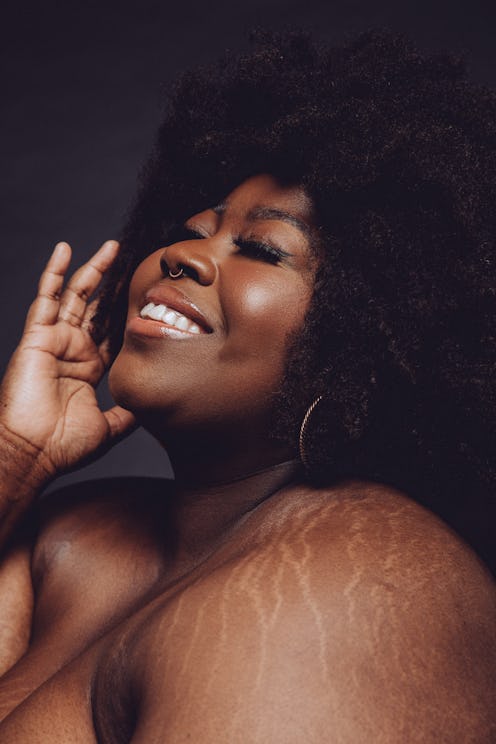Self
Stephanie Yeboah On Why She Decided To Write A "Love Letter" To Plus-Sized Black Women
The content creator’s first book, Fattily Ever After, is out on September 3.

Stephanie Yeboah is in the midst of celebrating a few exciting victories when we chat on the phone in late August. The content creator and campaigner's first book Fattily Ever After is due to be released September 3, and it feels like a long time coming. The book is a culmination of years of body activism online and it's also a milestone in her own self-acceptance journey as a dark-skinned, larger woman. As she explains: "Black women and our bodies have gone through it."
But on top of publishing and promoting a book, Yeboah has also thrown herself into another project, helping to support fellow influencer Nyome Nicholas-Williams in a campaign to have her deleted photos re-instated on Instagram. This work led to a game-changing conference call between Yeboah and Instagram in which they discussed the importance of meaningful representation on the social platform. As the #WeWantToSeeNyome petition gained media buzz, Instagram appeared to finally be listening. A victory indeed.
Stephanie is no stranger to the ups and downs of dealing with Instagram, however. It's where she built her community, devoting much of her digital life to encouraging the visibility of fat, Black, dark-skinned women. It's been a beautiful journey to watch.
The book was the inevitable next step for the 31 year old and Fattily Ever After is Yeboah's unfiltered truth – sometimes painful, funny, extremely informative and very necessary.
L'Oréal Blackett: Why did you decide to write Fattily Ever After?
Stephanie Yeboah: It’s a love letter to plus-size Black women.
I wanted to write this book because I feel we needed a voice somewhere. I was tired of the same narrative of privileged bodies being able to command all the visibility and be shown in a positive light in the media. I talk about Black fat women when it comes to dating, mental and physical health, and how we sometimes compare our plus-sized Black bodies to plus-sized white bodies.
LB: With that said, is the body positivity movement still working in 2020?
SY: From a political standpoint, the [body positivity] space was created for larger plus-sized women, women of colour, and disabled bodies and all of the women who do not have the same privileges as slim, white women. Yet, when you look at the community now, a power shift has been given to those who are white, very attractive and are at most size 16 or 14. It no longer feels like a safe space for larger-sized women and darker plus-sized women to celebrate our bodies in a world that constantly marginalises and shuns us.
LB: You tackle some difficult themes in the book, how was the writing process?
SY: I found it soothing and cathartic. I started writing on my blog and I found it a great way to dump all of the negative feelings I ever had about myself and my body while simultaneously being able to connect with people who feel exactly the same. Writing about the most personal parts of myself was incredibly emotional. I learned real things about myself.
LB: You share your experiences with bullying and dating, what was the most difficult anecdote to share?
SY: I guess talking about the way I was treated by my dad. I talked about it with my therapist and it made me realise I had dad issues and I never really thought I did.
He would consistently scold me for being overweight. Or take away my food when I was eating. When I wrote about how the bigger I got, the more distant he became... I think that was my first taste of rejection linked to my weight. I haven't spoken to him about it yet.. If he ever does read the book, I guess we’ll have that conversation!
LB: You are a very strong self-love advocate, how did you get to loving yourself today?
SY: I was tired of living in this alternate reality where I was slim and lighter-skinned. When I lost three stone dangerously, I was like, it’s got stop. I had to ask: who am I trying to lose weight for? Because it's not for me. So I made the decision to love the parts of me I once deemed unacceptable. It’s a long, hard journey, the journey to self love.
LB: Can you tell me what your feelings are towards Instagram right now, especially considering your recent involvement with the #IWantToSeeNyome campaign?
SY: Instagram has been an instrumental part of my self love journey. It was one of the tools the body positivity community used to gain that visibility. However, all we need do is take a look at what happened with Nyome to see that there’s a problem with Instagram’s algorithms. The way to normalise fatter bodies is to see it in various states of undress. For us, it’s so awe inspiring and eye-opening to see someone with the same body as you with marks and scars and hyperpigmentation. So when that’s removed, it speaks volumes.
LB: What do you want people to get out of Fattily Ever After?
SY: When you exist as not only a woman, but a fat woman, a larger fat woman, a larger fat Black woman, and then on top of that a larger fat Black, darker-skinned woman, it’s almost if you lived in a world where you’re villainized and fetishised and marginalised at each of those levels. Navigating life when you exist at all those sections is incredibly difficult. So I’m hoping that this book will be able to show others to just treat us with the respect, compassion, and love that's deserved.
For my demographic, I just want them all to feel seen.
This interview has been edited and condensed for clarity.